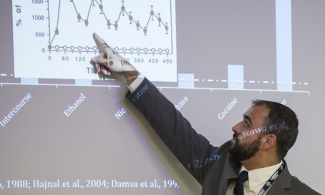Thursday, September 22, 2016
Dr. Joseph Gigliotti delivers the science behind why we eat for Biomedical Frontiers Seminar Series
Thu, 22 Sep 2016Asa Keimig, Marketing and PR Coordinator
The LUCOM-Center for Research hosted its first Biomedical Frontiers Seminar Series (BFSS) presentation of the academic year on Thursday, Sept. 15. Joseph C. Gigliotti, Ph.D., Assistant Professor of Physiology, led an informative session titled “Mouse or Man? You Are What You Eat.”
The series is open to anyone interested in biomedical or health sciences and welcomed over 30 guests to the Thursday night presentation. “For the first seminar of the series, it was exciting to have Dr. Gigliotti speak,” said Joseph W. Brewer, Ph.D., Associate Dean for Research. Dr. Brewer welcomed all those in attendance with an opening prayer and Dr. Gigliotti presented his research.
 The presentation focused on four specific areas; why do we eat, what are we eating, why should we care about what we are eating, and why should we care about what mice are eating. The science behind dieting, eating, food, and nutrition contains many highly debated concepts which can often become confusing. “Research from neuroscience and psychological research suggests that certain dietary components, such as sugars and fats, stimulate the same centers in the brain that are associated with the physiology of addiction, such as alcohol and illegal-drugs,” said Dr. Gigliotti. “Therefore, it is possible that the complex hormonal milieu that is implicated in regulating our dietary intake eventually culminates to stimulating our ‘reward’ or ‘want’ regions of the brain.”
The presentation focused on four specific areas; why do we eat, what are we eating, why should we care about what we are eating, and why should we care about what mice are eating. The science behind dieting, eating, food, and nutrition contains many highly debated concepts which can often become confusing. “Research from neuroscience and psychological research suggests that certain dietary components, such as sugars and fats, stimulate the same centers in the brain that are associated with the physiology of addiction, such as alcohol and illegal-drugs,” said Dr. Gigliotti. “Therefore, it is possible that the complex hormonal milieu that is implicated in regulating our dietary intake eventually culminates to stimulating our ‘reward’ or ‘want’ regions of the brain.”
Dr. Gigliotti’s research was based on data obtained through the Center for Disease Control which showed the “typical” American consuming a diet that is high in sugar and simple carbohydrates, low in dietary fiber, high in phosphate and excessively high in sodium, very low in potassium, and low in the fat-soluble vitamins (A, D, E, and K). “Aside from the inadequate nutritional quality, the ‘typical’ American diet also contains various bioactive compounds including trans-fatty acids, bisphenol-A, and caffeine that have strong positive associations with disease risk,” he said. “Based on recent analyses of the Global Burden of Disease Study in 2010, diet and physical activity are the leading causes of reduced quality of life.
The Federal government spends an estimated $13-15 billion annually to fund projects with an animal research component, most commonly involving mice and rats. “As a healthcare provider or patient, it is important to consider the value of animal research given the financial burden and relatively low success rates of translating drugs and treatments from animals to humans,” said Dr. Gigliotti. “Many in the scientific community believe the design of animal experiments needs to be improved to better model the corresponding human disease.” Dr. Gigliotti has developed a diet that better models human eating patterns, and his research focus is to first determine how diet and aging influence risk factors for heart (obesity, hypertension, dyslipidemia, hyperglycemia) and kidney diseases in mice.
Dr. Gigliotti received his B.S. in Biochemistry from West Virginia University, and then went on to receive his M.S. and Ph.D. in Animal and Nutritional Sciences from WVU. Dr. Gigliotti completed his postdoctoral training in Nephrology and Immunology at the University of Virginia’s School of Medicine.